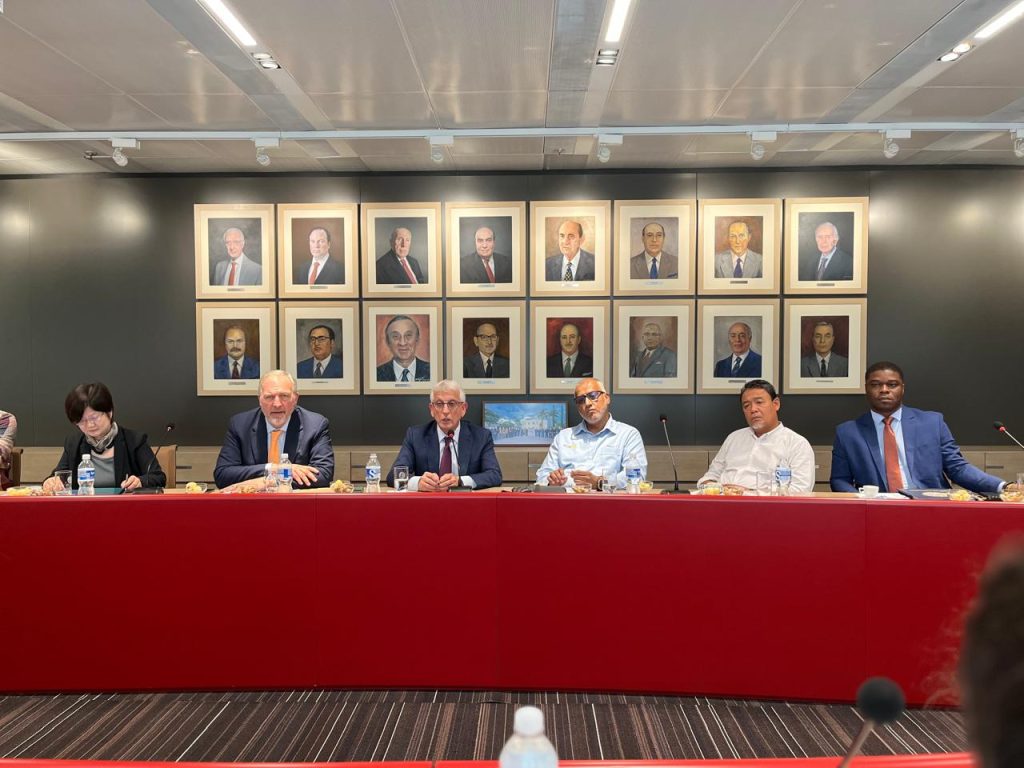São Paulo – Strategic geographical location to reach Southeast Asian markets and infrastructure for product manufacturing were some of the benefits presented by a delegation from the state of Perak, Malaysia, to Brazilian businesspeople on Friday (14). The meeting took place at the headquarters of the Arab-Brazilian Chamber of Commerce (ABCC) in São Paulo and was attended by executives from the institution.

Malaysia, a country with 34 million people, is located in Southeast Asia, close to two of the most populous nations in the world, India and China. This proximity is one of the attractions for companies looking to export to the region, said Seri Timor Shah Rafiq, CEO of Ayenda Resources Sdn Bhd consultancy and one of the leaders of the Malaysian delegation, in an interview with ANBA. Perak’s industrial hub allows companies to export raw materials or unprocessed products, such as meats, to the region and then re-export them processed to various consumer markets.
The opportunity to come to Brazil, he said, arose from a conversation with the former Brazilian ambassador in Kuala Lumpur, Ary Quintella, who recently left his post to take up a new role in Angola. During their visit to Brazil, the Malaysian delegation met with officials in Rio de Janeiro and São Paulo.
According to Rafiq, the current moment is an opportune time to enhance diplomatic, commercial, and investment relations between Brazil and Malaysia, both due to ongoing protectionist measures and the fact that Malaysia holds the presidency of the Association of Southeast Asian Nations (ASEAN), while Brazil is currently the president of the BRICS group, which includes Brazil, Russia, India, China, South Africa, Egypt, United Arab Emirates, Iran, and Ethiopia. Malaysia has been a “partner country” of BRICS since January.
ABCC Vice President of International Relations & Secretary-General Mohamad Mourad, and Director of Institutional Relations Fernanda Baltazar invited the Malaysian delegation to participate in the Global Halal Brazil Business Forum in October of this year. The biennial event is organized by the ABCC and halal food certification body Fambras Halal, which certifies products made according to Islamic standards.
Halal: Brazilian products made according to Islamic standards
The ABCC and the Brazilian Trade and Investment Promotion Agency (ApexBrasil) spearhead the Halal do Brasil project, which promotes halal food and beverages made in Brazil abroad. Later this year the Halal project will take Brazilian companies to the MIHAS trade fair in Malaysia for the third time as a way to showcase Brazilian products. Rafiq said that food companies are among the priorities that the Perak industrial zone aims to attract from Brazil, along with mining companies. Currently, the only Brazilian company operating in Perak is miner Vale, which exports ore to the region, processes the product, and then reexports it to China, according to Rafiq.
“From Malaysia, the company is close to several markets: Indonesia is very close, China is nearby. One can reach all ASEAN countries and also the Middle East, which is closer to Malaysia than to Brazil,” said Rafiq, referring to the Arab countries.
The meeting between Malaysians and Brazilians included representatives from Brazilian companies Unisource Tecnologia, Cianorte, Finocchio & Ustra, Target Relocation, K&K, and FASC. Anna Homem from Qatar Airways also participated.
The Malaysian delegation was composed of Rafiq, the CEO of the Lumut Port Terminal, Haji Mubarak Ali Bin Gulam Rasul, the COO of the Terminal, Mohd Rusly Bin Tamsir, the Head of Business Development at Lumut Port Terminal, Alex Staring, and the Director of the Investment Promotion Division of the Perak State Development Corporation, Ch’ng Soo Bee. The Trade Attaché of the Malaysian Trade Promotion Office in São Paulo, Kossi Telou, is accompanying the mission on its appointments in Brazil.
The meeting was also attended by ABCC Board members William Atui and Arthur Jafet.
Read more:
Halal project seeks clients at Malaysia trade fair




